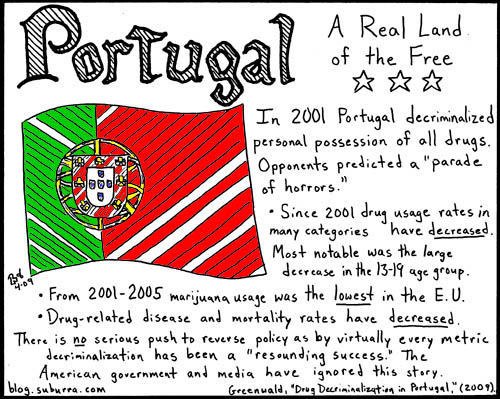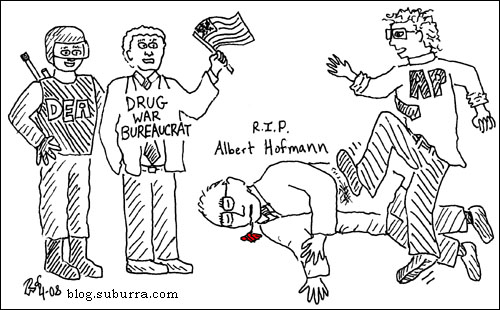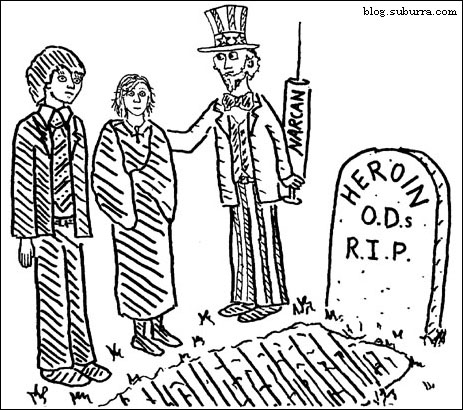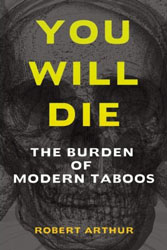Posted: April 6th, 2009 | Filed under: drugs, legalization, marijuana | 34 Comments »

On Friday I attended Glenn Greenwald‘s presentation of his report, “Drug Decriminalization in Portugal,” at the Cato Institute. Greenwald studied how Portugal’s policy of decriminalizing the personal possession of all drugs in 2001 has fared. Portugal’s policy has been a “resounding success.”
Decriminalization is dismissed out of hand by those that consider drugs a moral issue, but prohibitionists that stoop to debate argue decriminalization will bring a “parade of horrors.” Some of these are that usage and addiction rates will explode, more children will do drugs, and decriminalized areas will become drug tourist havens that will spread addiction throughout the world.
None of these things have occurred in Portugal. Instead a massive amount of financial resources have been freed up to provide treatment to those that want it. In addition, more of the population has been willing to take advantage of government-supplied treatment now that there is no fear of criminal ramifications.
These results are unsurprising to those that understand how exaggerated the evils are surrounding “hard” drugs. On average, criminalization prevents responsible and conscientious people from using drugs – the exact population that can handle the freedom sensibly.
Note: Greenwald pointed out that the Portuguese commission had considered legalization but believed it could not legalize without violating international treaty obligations. (These treaties are enforced by zealous drug-war states like the United States.) He added that small countries like Portugal actually have to follow international treaties.
Sources:
1. Glenn Greenwald, “Drug Decriminalization in Portugal,” (2009). LINK
Posted: May 1st, 2008 | Filed under: drugs, hallucinogens, LSD, media bias | 2 Comments »

R.I.P. Albert Hofmann
News organizations have acknowledged that their coverage leading up to the Iraq War was “far too deferential and uncritical.” (LINK) At least they had an excuse – how do you investigate cooked “intelligence” cloaked in “national security”? When will news organizations acknowledge they have perpetuated the War on Drugs by echoing its falsehoods? Is it too much to ask that they investigate scientific literature?
A case in point is the AP article, “Albert Hofmann, Father of Drug LSD, Dies in Switzerland” written by Frank Jordans. The bias is exposed in the opening sentence:
Albert Hofmann, the father of the mind-altering drug LSD whose medical discovery inspired – and arguably corrupted – millions in the 1960s hippie generation, has died.
LSD alters the mind temporarily. There is no evidence it affects the brain permanently. Is alcohol “mind-altering”? Is being sleep-deprived “mind-altering”? Who did LSD corrupt? Did it corrupt the youth into protesting the Vietnam War and segregation?
By plucking and placing quotes Jordans also gave the impression that Hofmann agreed that LSD had to be kept from responsible adults by law enforcement so that there are not “catastrophic consequences,” and that LSD should only be taken out of, “scientific interest.”
Of course, Jordans couldn’t restrain his moralizing and also had to wander into the land of urban myths and outright lies to justify its criminalization:
But away from the psychedelic trips, horror stories emerged about people going on murder sprees or jumping out of windows while hallucinating. Heavy users suffered permanent psychological damage.
The U.S. government banned LSD in 1966 and other countries followed suit.
Murder sprees? Is it 1955? Who’s feeding Jordans this crap, J. Edgar Hoover? Can the press still get away with this? Jordans knows that when these LSD horror tales have been investigated they turned out to be blarney which is why he used the untraceable and unverifiable language of “horror stories emerged.” Yes, a microscopically minute percentage of people have used LSD in idiotically irresponsible manners and hurt themselves. The same can be said for alcohol, cars, ladders, gas stoves, and trampolines.
There is no evidence LSD causes brain damage. (It can exacerbate the symptoms of those who already suffer from mental health disorders.)
Of course this article failed to mention how acid was intricately linked with the early developers of the modern computer like Steve Jobs. (Bill Gates did it too.) It doesn’t mention how the likes of Aristotle, Plato, & Cicero partook of a natural form of LSD in the rites of the Eleusinian Mysteries. And it doesn’t mention how responsible users often describe tripping as one of the most awesome experiences of their lives.
In the words of Albert Hofmann himself on the 50th anniversary of his discovery:
You, my dear friends, and millions all over the world who now commemorate the 50th birthday of [LSD], we all testify gratefully that we got valuable help on the way to what Aldous Huxley said is the end and the ultimate purpose of human life–enlightenment, beatific vision, love. I think all these joyful testimonies of invaluable help by LSD should be enough to convince the health authorities, finally, of the nonsense of the prohibition of LSD and of similar psychedelics.
For an LSD article that dares to stray from the “Just Say No” party line go to Wired, LINK.
Sources:
- “Albert Hofmann Foundation,” Hoffman.org, ret. 1 May 2008. LINK
- AP, “Study: Bush Led U.S. to War on ‘False Pretenses,’ Hundreds of False Statements on WMDs, al-Qaida Used to Justify Iraq War,” MSNBC.com, 23 Jan. 2008, ret. 30 Apr. 2008. LINK
- Robert Arthur, You Will Die: The Burden of Modern Taboos (2007). LINK
- Frank Jordans, “Albert Hofmann, Father of Drug LSD, Dies in Switzerland,” AP, 30 Apr. 2008, ret. news.yahoo.com, 1 May 2008. LINK
Posted: April 23rd, 2008 | Filed under: drugs, heroin, legalization, opiates | 59 Comments »

Heroin Kills?
To get people to read my book I employ the common technique of teasers. Teasers for non-fiction books are often facts that will startle the reader and encourage them to find out more. None of my teasers have provoked greater skepticism, scorn, and anger than the statement, “Heroin is harmless.”
I am not naive or callous. As a public defender I frequently interviewed heroin addicts upon their incarceration. I saw firsthand these people going through withdrawal and I saw the tragedies their lives had become. However, almost all – if not all – of the damage heroin had inflicted upon these people and their families was due to the drug’s criminalization. I will explain.
Three aspects of an ingestible substance that can be considered harmful are (1) its potential to debilitate, (2) its effects on one’s health, and (3) its potential to kill via an overdose.
(1) Like the stimulants, caffeine and cocaine, heroin is not a debilitating drug. That is, moderate usage does not interfere with one’s functioning, e.g. driving ability. This is in contrast to alcohol, in which one’s performance is directly hampered. Extreme usage can interfere just like with caffeine and cocaine, e.g. too much of a stimulant can make it difficult to focus and even cause hallucinations. However, even heroin addicts can moderate their usage so that they can work unimpaired and avoid withdrawal symptoms. For this reason, heroin addicts can and do have successful professional lives in such diverse fields as surgery and law enforcement.
(2) Long-term heroin addiction is relatively harmless to one’s health. Like caffeine addicts who “need” their coffee in the morning, the side-effects are minimal. Heroin’s long-term side-effects can include constipation and impotency. This is in contrast to alcohol and tobacco which destroy the liver and the lungs respectively.
(3) Like caffeine, it is difficult to fatally overdose on heroin by itself. (It is easy to overdose when using heroin and alcohol in combination.) The popular image of a dead heroin user with the needle still in his or her arm is misleading. A fatal heroin overdose is usually a long process that takes over an hour and it can be countered within minutes by an antidote.
This antidote is Narcan. It is so tightly regulated that strict limits on its usage have caused overdose deaths even when paramedics were present. Narcan is not dangerous or addictive which leads one to believe the government wants heroin users to die. This twisted thesis is reinforced by recent comments made in light of nasally administered Narcan (LINK).
Lastly, heroin withdrawal – unlike alcohol withdrawal – is never fatal.
In many ways heroin is as harmless as caffeine and it is definitely less harmful than alcohol. Heroin has garnered the reputation of the deadliest and most evil of drugs largely due to side-effects from the War on Drugs. To learn the awesome and fascinating reality of it all, read my book, You Will Die: The Burden of Modern Taboos. For more on the safe usage of heroin devoid of moralizing read Dr. Francis Moraes’ Heroin User’s Handbook. (Moraes is a former heroin addict.)
Sources
- Robert Arthur, You Will Die: The Burden of Modern Taboos (2007). LINK





